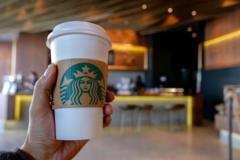As South Korea prepares for its presidential election on June 3, Starbucks has restricted the use of candidate names on its app to avoid political contention. This unprecedented move highlights the rising tensions following former President Yoon Suk Yeol's impeachment, and the pressing need for neutrality among businesses in the country’s increasingly polarized climate.
Starbucks Steers Clear of Political Discourse as Election Season Heats Up in South Korea

Starbucks Steers Clear of Political Discourse as Election Season Heats Up in South Korea
In an effort to maintain its political neutrality during a charged election cycle, Starbucks bans names of presidential candidates from its app in South Korea.
Starbucks has temporarily disabled the option for customers to use the names of six presidential candidates while placing orders through its app. The company stated that this decision was made to ensure a pleasant experience for all patrons and to uphold its stance of political neutrality during this tumultuous election period. The names blocked include prominent figures such as Lee Jae-myung, Kim Moon-soo, and Hwang Kyo-ahn among others, following a surge of customers using politically charged phrases in their orders.
Despite the intent behind the ban, reactions from the public vary. Some customers feel the decision is excessive, pointing out the irony if their actual names correspond with those of candidates. Others appreciate the need for distancing from political discussions amid heightened tensions that can lead to disagreements. This sentiment echoes across various sectors, including South Korea's largest search engine, Naver, which similarly restricts autocomplete features related to candidates during election time.
The political sensitivity extends beyond coffee orders, as public figures and celebrities are under scrutiny for their expressions of political alignment, whether through the color of their attire or social media posts. The diplomatic handling of political symbols becomes paramount, as even neutral gestures like wearing colors associated with rival parties can provoke backlash.
As the election approaches, the overarching aim across South Korean society remains clear: an attempt to foster dialogue and reflection without exacerbating the existing ideological schism. Dr. Cho Jin-man of Duksung Women’s University highlights the importance of being able to discuss divergent views while recognizing the need for silence to maintain a neutral stance during these divided times.
Despite the intent behind the ban, reactions from the public vary. Some customers feel the decision is excessive, pointing out the irony if their actual names correspond with those of candidates. Others appreciate the need for distancing from political discussions amid heightened tensions that can lead to disagreements. This sentiment echoes across various sectors, including South Korea's largest search engine, Naver, which similarly restricts autocomplete features related to candidates during election time.
The political sensitivity extends beyond coffee orders, as public figures and celebrities are under scrutiny for their expressions of political alignment, whether through the color of their attire or social media posts. The diplomatic handling of political symbols becomes paramount, as even neutral gestures like wearing colors associated with rival parties can provoke backlash.
As the election approaches, the overarching aim across South Korean society remains clear: an attempt to foster dialogue and reflection without exacerbating the existing ideological schism. Dr. Cho Jin-man of Duksung Women’s University highlights the importance of being able to discuss divergent views while recognizing the need for silence to maintain a neutral stance during these divided times.


















